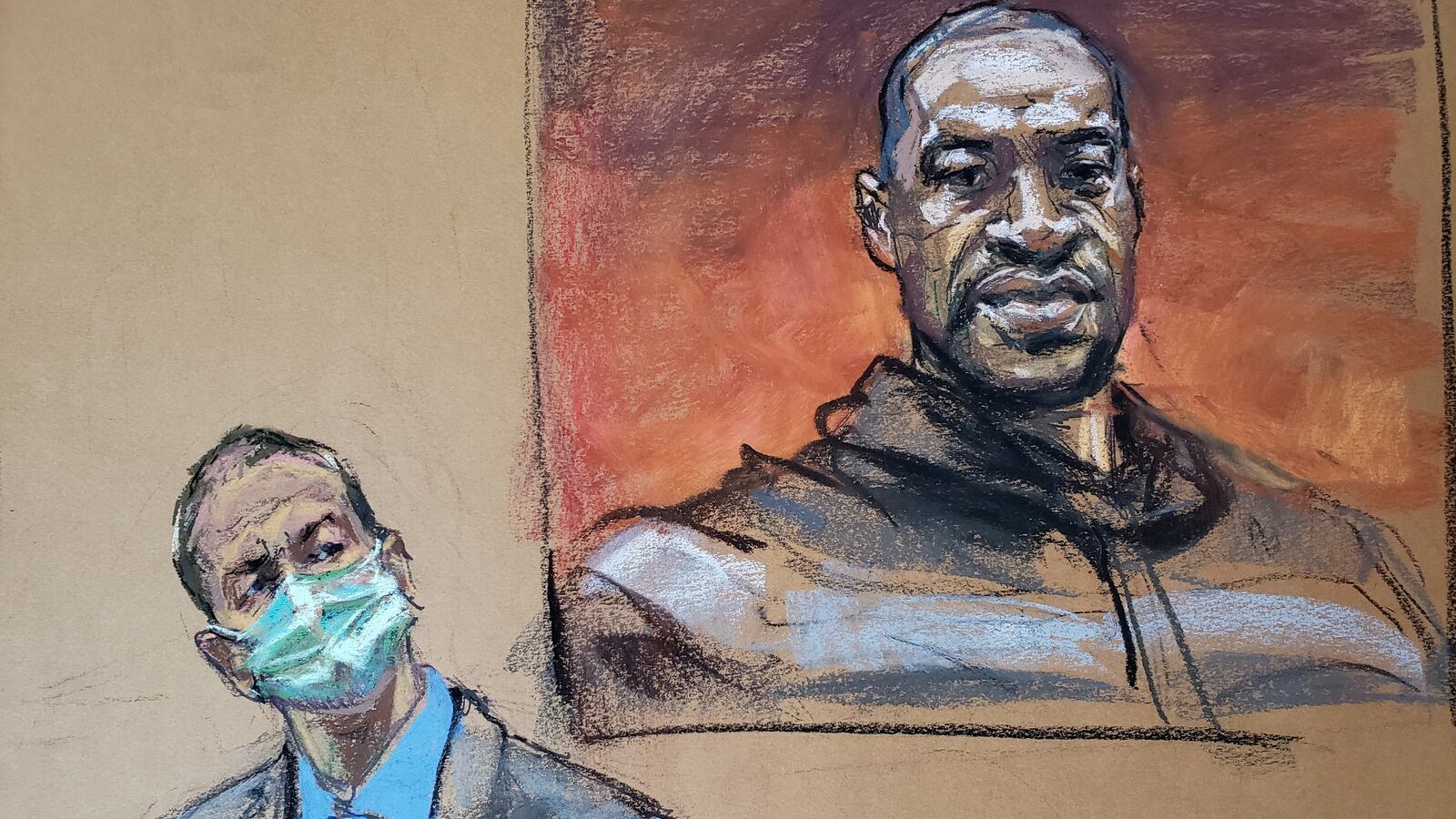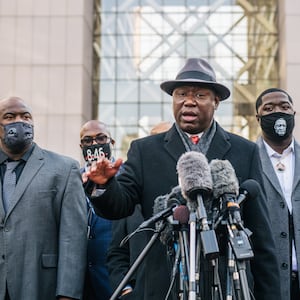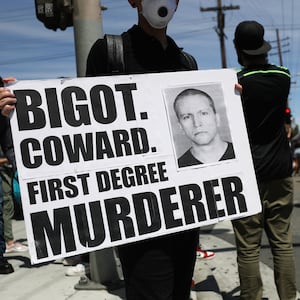MINNEAPOLIS—As 911 dispatcher Jena Lee Scurry watched live footage of George Floyd’s arrest, she got the sickening feeling something had gone wrong.
Floyd had been on the ground with two officers for so long she thought “the screens had frozen.” That’s when she called a supervisor.
“My instincts were telling me that something was wrong,” Scurry, who’s worked as a dispatcher for seven years, testified Monday at former Minneapolis Police Officer Derek Chauvin’s murder trial. “It was a gut instinct in the incident, something is not going right.”
Scurry told the supervisor that Floyd’s May 25 arrest outside a Minneapolis Cup Foods looked “a little different.”
“I don’t know if they had to use force or not, but they got something out of the back of the squad, and all of them sat on this man,” she said in a recording of the call played in court.
The arrest was very different, prosecutors stressed at the start of Chauvin’s murder trial on Monday. During opening arguments, prosecutors argued that Floyd “died one breath at a time,” as Chauvin pressed his knee into his neck for nearly 10 minutes, ignoring the 46-year-old Black man’s dozens of pleas for help.
“You can believe your eyes that it’s homicide. It’s murder. You can believe your eyes,” special prosecutor Jerry Blackwell said.
Less than a year after a video of Floyd’s fatal May 25 arrest over a counterfeit $20 bill went viral, launching nationwide protests, prosecutors argued in a court that Chauvin “betrayed” his badge during the bust.
“He put his knee upon his neck and his back, grinding and crushing him until the very breath, no ladies and gentlemen until the very life was squeezed out of him,” Blackwell said.
The ex-officer knelt on Floyd for a total of “9 minutes and 29 seconds,” prosecutors said, while Floyd cried out that he couldn’t breathe a staggering 27 times before losing consciousness.
“This case is not about split-second decision making,” Blackwell argued. “You will see, at the same time, while he’s crying out, Mr. Chauvin never moves. The knee remains on his neck, sunglasses remain undisturbed on his head. And it just goes on.”
Chauvin, one of four officers charged in connection with Floyd’s death, has pleaded not guilty to second and third-degree murder as well as second-degree manslaughter. He faces up to 40 years in prison if convicted. The former cop’s lawyer, Eric Nelson, argued Monday that “there are always two sides” to a story and urged jurors to ask themselves if his client simply acted as any other police officer would.
During opening statements, prosecutors showed the jury one of the now-infamous videos of Chauvin kneeling on Floyd’s neck, noting that bystanders were forced to call “the police on the police.”
In the video, witnesses can be heard screaming at Chauvin, telling him to stop and “check his pulse.” “You got him down. Let him breathe at least,” one person yells. “He’s Black. They don’t care,” another woman says.
As jurors watched the gut-wrenching video, Chauvin, dressed in a grey suit and blue face mask, took notes on a legal pad.
Donald Williams, a 33-year-old MMA fighter who has worked security with off-duty MPD officers, can be heard in one of those videos begging officers to check Floyd’s pulse and stop using a “blood choke.”
“There are air chokes and there are blood chokes...blood chokes cut off the circulation of your arteries,” Williams told the court on Monday, adding that he has had experience with proper chokeholds.
Williams said that on May 25 when he approached the police squad car, he saw Floyd on the ground “pretty much pleading for his life.”
He yelled at Chauvin about the “blood choke,” and they “looked each other dead in the eyes” while Floyd was “gasping for air,” he testified.
“When I first got there Floyd was vocalizing his pain and distress, [but] the more the knee was on his neck the more you see Floyd fade away, like a fish in a bag you see his eyes slowly roll to the back of his head, his nose bleeding,” William said, calling it “torture.”
By the time Floyd was loaded into an ambulance, EMTs said he had no pulse. The Hennepin County Medical Examiner later concluded Floyd died of cardiac arrest from the restraint and neck compression, also noting that Floyd had heart disease and there was fentanyl in his system. An independent report commissioned by Floyd’s family, which will not be shown at trial, concluded that the 46-year-old died of strangulation from the pressure to his back and neck. Both reports determined Floyd’s death was a homicide.
“We will bring you all of the evidence of all the warnings Mr. Chauvin would have heard,” Blackwell said. “Not just Mr. Floyd screaming. Bystanders, sirens—all when you [the jury] considers intent.”
Nelson argued Monday that evidence will show Floyd ingested drugs during the arrest—and that’s what ultimately killed him.
Three other officers—Tou Thao, Thomas K. Lane, and J. Alexander Kueng—assisted with the arrest, holding down Floyd’s legs and trying to keep concerned bystanders at bay. All three have pleaded not guilty to aiding and abetting second-degree murder while committing a felony, as well as aiding and abetting second-degree manslaughter with culpable negligence. They are expected to face a trial together in August.
A 12-person jury made up of eight women and six men, including two alternates, will now decide if Chauvin intended to harm Floyd during the arrest. Long-simmering anger about racial injustice and police brutality exploded in the days and weeks after Floyd’s death, prompting people across the nation to take to the streets in protests. Floyd’s final pleas became a rallying cry, bringing renewed energy to the Black Lives Matter movement.
Before court began on Monday, Floyd’s family and their legal team warned prosecutors at a press conference that “America is watching” the “landmark trial” that will “prove if we live up to the belief that all men are created equal.” As they spoke, a large swath of journalists crowded outside of the Hennepin County Government Center.
Around the corner, Marcus X. Smith, 42, from Minneapolis, chanted and chastised the police and National Guardsmen standing watch.
“Because we have so many Black people that have lost their lives at the hands of police officers, I think this is the perfect time for reconciliation, for the government and the people to actually show us that they care about a justice system,” Smith said. “We want justice. We want all of the officers found guilty.”
Others who lost family members at the hands of police also attended a small gathering outside the courthouse. Gwen Carr, the mother of Eric Garner—a Black man who died in New York police custody in 2014 while telling police officers he couldn’t breathe—was also present outside the courthouse on Monday after traveling with a social justice organization to support the Floyd family.
“This was so close to what happened to my son, it’s like an echo from the grave, and we’re saying, 'No more,'” Carr said. “We don’t want this to happen to another family. So this is why we stand today, we stand in solidarity with each and every family who has suffered these heinous losses.”
Chauvin’s lawyer, Eric Nelson, told jurors on Monday to “let common sense and reason” guide them, not “political or social causes.”
“At the end of this case we’re going to spend a lot of time talking about doubt,” Nelson said, arguing that Floyd did use a counterfeit $20 to purchase cigarettes at Cup Foods and that the convenience store clerk told authorities he was under the influence when he entered the store.
Pointing to the viral video played in court, Nelson urged jurors to “remember there is more to the scene than what officers see in front of them. It’s what officers can perceive to be a threat.”
“Derek Chauvin did exactly as he was trained to do throughout his 19-year career,” Nelson insisted. “The use of force is not attractive, but it is a necessary component of policing.”








